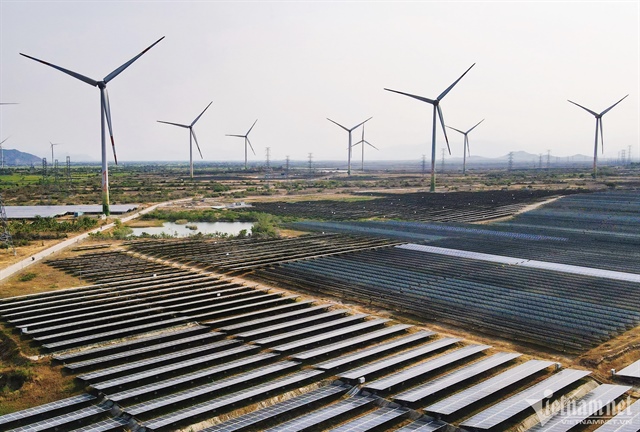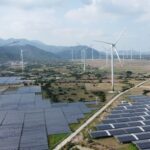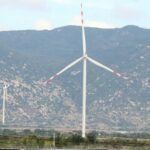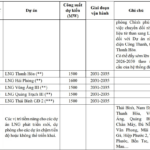The Ministry of Industry and Trade has recently reported to the Prime Minister on resolving issues related to preferential electricity prices (FIT) for renewable energy projects of investors according to Resolution No. 233 dated December 10, 2024, on removing obstacles for renewable energy projects.
EVN has both the authority and responsibility
Regarding the authority to resolve issues related to preferential prices, the Ministry of Industry and Trade emphasized that according to the Law on Electricity, agreeing, signing power purchase agreements, and recognizing the commercial operation date (COD) of solar and wind power projects are within the authority of the Vietnam Electricity (EVN).
According to Conclusion 1027, the Government Inspectorate concluded that “the responsibility for the shortcomings and violations in recognizing COD and purchasing electricity from solar and wind power plants at the fixed prices being applied belongs to the project owners, the power purchase company, and EVN.”
Thus, EVN is the agency with the authority and responsibility to resolve issues related to COD to determine eligibility for preferential prices and is responsible for coordinating with investors to propose a decision and agreement on preferential prices for renewable energy projects, according to the Ministry of Industry and Trade.
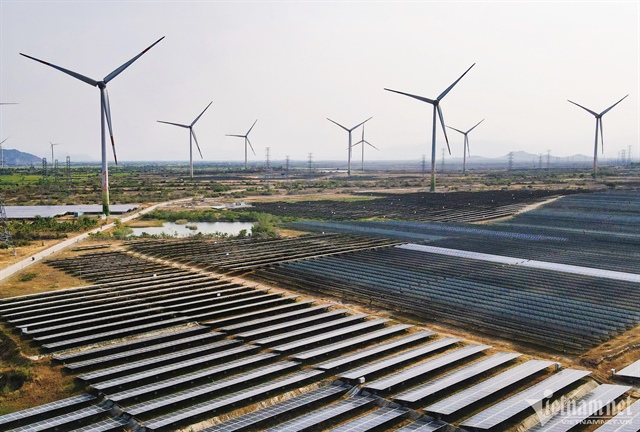 Numerous issues regarding preferential electricity prices FIT for renewable energy projects. |
Regarding the solution to handle the problems, the Ministry of Industry and Trade reported to Deputy Prime Minister Nguyen Hoa Binh, and the Deputy Prime Minister agreed on the plan to implement Resolution 233.
Accordingly, EVN is the unit that determines the conditions for enjoying incentives and is also the competent authority for approval.
As for the order of settlement, EVN presides and coordinates with investors of projects to determine the conditions for enjoying incentives. For projects that are not eligible for incentives, EVN reports to the competent authority issuing regulations on electricity prices for the parties to make a basis for offsetting electricity bill payments.
Accordingly, the Ministry of Industry and Trade has had many documents urging and guiding EVN to implement. EVN also has many documents and reports related to resolving difficulties in enjoying preferential prices for wind and solar power projects.
However, the Ministry affirmed that EVN’s reports have not been in line with Resolution 233. Therefore, the Ministry of Industry and Trade has repeatedly reminded them in writing.
In the latest report sent to the Ministry of Industry and Trade, EVN stated: “EVN does not have enough information to assess the overall impact on socio-economic and investment environment in Vietnam and internationally because this is a macro issue that needs support from higher-level state management agencies. Opinions of investors on the impact on the investment environment, finance, and interests of investors, the risk of bankruptcy and cessation of operation…
At the minutes of meetings and official documents thereafter, investors have mentioned and reserved the right to complain and sue in case EVN implements temporary payment. EVN believes that the risk of complaints and disputes (including international arbitration) is entirely possible on a large scale.
However, the Ministry of Industry and Trade believes that EVN’s report is not sufficient, and its implementation does not ensure compliance with Resolution 233. EVN’s documents sent to the Ministry mainly summarize investors’ opinions and do not reflect the role and responsibility of this unit in resolving difficulties.
Difficulties in determining the conditions for enjoying preferential prices, recognizing COD, and implementing the contents of signed power purchase agreements of renewable energy projects are now the rights and responsibilities of enterprises (investors and EVN). The Ministry emphasized that state management agencies can only guide compliance with legal regulations, direct and urge related enterprises to actively coordinate to resolve them.
Investors disagree with EVN’s solution
The Ministry of Industry and Trade also said that at the end of May, the Electricity Department organized a meeting with investors of renewable energy projects (with more than 36 representatives of enterprises and associations participating) to exchange and listen to investors’ opinions on the results of resolving difficulties and obstacles of EVN.
At the meeting, investors expressed their disagreement with EVN’s current solution of temporary payment and application of provisional prices for renewable energy projects.
Given this situation, the Ministry of Industry and Trade proposed to the Prime Minister to consider directing EVN to urgently resolve difficulties and agree with investors of wind and solar power projects on COD and preferential prices. At the same time, report to the Ministry of Industry and Trade for synthesis before June 5.
In case of delay, EVN will take responsibility to the Prime Minister.
Regarding EVN’s assessment of “the risk of complaints and disputes is entirely possible on a large scale, including international arbitration by Super Energy Group,” it is proposed that the Ministry of Justice coordinate with EVN and related agencies to research and evaluate and soon report to the Prime Minister.
|
Currently, investors of more than 100 wind and solar power projects have simultaneously sent petitions to competent authorities, expressing concern about the risk of retroactive electricity prices, affecting a total investment of more than 13 billion USD. Retroactivity may cause their renewable power plants to no longer enjoy the preferential selling price of 9.35 US cents per kWh of FIT1 or 7.09 US cents of FIT2. The purchase price will be lower, even not exceeding the ceiling price of 1,184.9 VND per kWh for transitional projects. Considering EVN’s retroactive electricity selling price inappropriate, investors have proposed several recommendations that if EVN applies a provisional price that causes damage to the projects and then there is a different decision from the state management agency, EVN must compensate for the damage to the investors. The damage may include interest penalties in credit contracts, losses from stock price declines for listed projects, and other incidental expenses. |
Tam An
– 10:16 06/06/2025
“The Great Deception: Unraveling the Schemes of a Six-Year, Multi-Billion Dollar Fraud”
The Hanoi Police Investigation Agency is urgently seeking shareholders and investors who have contributed capital to this company.
The Renewables Rush: A Race Against Time for Ninh Thuan’s Green Energy Projects
The renewable energy projects in Ninh Thuan are facing delays due to challenges with electricity pricing frameworks and land clearance procedures. These obstacles have hindered the timely progress of these initiatives, underscoring the need for streamlined processes to facilitate the development of sustainable energy sources in the region.
Vingroup Pursues 5,000 MW Hai Phong LNG Project, Revised Power Development Plan VIII Draft Proposes 1,600 MW with a Five-Year Delay
The latest draft adjustment to the PDP VIII has included the Hai Phong LNG power project in the list of important national power and grid projects and prioritized it for the electricity sector. However, the project’s parameters differ from those proposed by Vingroup.

